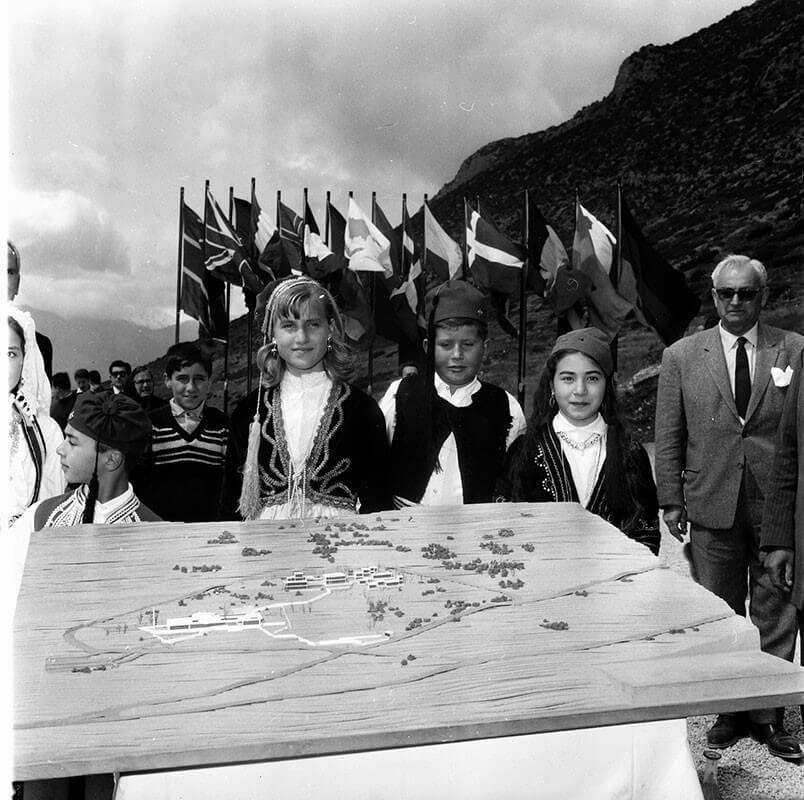The Delphic Centre can become an institution that expresses the ideals, cultural values and even the concerns of modern Europe.
Konstantinos G. Karamanlis

The European Cultural Centre of Delphi (E.C.C.D.) was founded in 1977 thanks to the inspiration and initiative of Konstantinos Karamanlis with the view to establishing a European and worldwide intellectual centre in Delphi.
Discussions about the foundation of such a centre began in the 1930s when, in the aftermath of the Delphic Festivals (1927 and 1930), the Parliament and the Senate passed a law providing for the establishment of an International Intellectual Cooperation Centre. In 1957, Greece filed a draft proposal to the Council of Europe for the foundation of an Intellectual Centre in Delphi, which was also accepted.
The conference hall was designed by the architects Kostas Kitsikis and Antonios Lampakis; its construction began in 1966 and was completed in 1970. The cost was covered by state funds and funds of the Council of Europe.
In 1977, by an act of the Greek Parliament, the E.C.C.D. was established under the supervision of the Hellenic Ministry of Culture and the auspices of the Council of Europe.
According to its founding law, its aim is to “serve international cultural interests” and “develop common cultural principles that will unite the peoples of Europe” through the “publication of studies on European culture, the organisation of cultural meetings and other cultural activities…”
To this end, the E.C.C.D., during its longstanding activity in the field of culture, has organized numerous events and run several programmes, such as:
- Delphi Academy of European Studies, which focuses on the diachronic and synchronic study of European history and culture and the ways in which Europe today responds to the multifaceted challenges of political, economic, and cultural globalisation.
- International Meetings on Ancient Drama, which promoted cultural dialogue between different theatrical traditions and functioned as a multicultural and multilingual laboratory where new proposals on ancient drama could be performed, recorded, and put to the test.
- Seminars in Ancient Greek, aiming at the training of classical philologists and secondary school teachers in European countries in ancient Greek.
- Panhellenic Debating Competitions with the participation of high school students from all over Greece and the support of the Hellenic Ministry of Education.
- Fine Arts Programme, the result of the various activities of which was the creation of a Sculpture Park and a rich permanent Collection of Contemporary Art in Delphi.
Today, guided by its statutory mission and rich tradition, the E.C.C.D. sets as a priority the exploration of issues directly related to the rapid developments experienced by humanity in the fields of culture, thought, politics and sciences, and enriches its programmes with new annual initiatives, such as:
- Delphi Dialogues, where eminent thinkers and world-class scientists discuss burning topical issues and challenges that humanity is facing or is bound to face in the near future.
- Theatre Education Programme, which aims to bring the younger generation into contact with contemporary trends in theatre and the working methods of great masters of world theatre.
- Annual conference on Antiquity & the Modern World, aiming at the promotion of a creative dialogue between classical antiquity and contemporary culture.
- Annual conference on the challenges and prospects of Greek and European cultural diplomacy.
- Artists/thinkers/authors-in-residence programme addressed mainly to established but also to promising artists, writers, and thinkers from all over the world, who will stay and create at the Delphi Centre.
- International Delphic Cultural Network, which will promote cultural interactions and collaboration between European and other countries.

